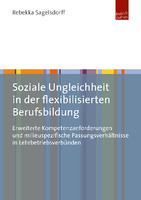Soziale Ungleichheit in der flexibilisierten Berufsbildung
Erweiterte Kompetenzanforderungen und milieuspezifische Passungsverhältnisse in Lehrbetriebsverbünden
Abstract
In Switzerland, "Lehrbetriebsverbünde" (apprenticeship company networks) represent a new model of vocational training. The author shows that the project-based organisation of this form of basic vocational training, in which learners change companies several times, constitutes new mechanisms of social inequality in the field of basic vocational training. This is due to the fact that training company networks place substantially higher demands on the self-organisation and flexibility of learners than traditional apprenticeships. A confident handling of these requirements requires specific prerequisites and resources that are unequally distributed in terms of social structure. Nevertheless, training company networks also offer the opportunity to reduce social inequality. The prerequisite for this is that training company networks do not presuppose the unevenly distributed key competences such as flexibility and self-organisation, which are fundamental to working life, as skills, but rather systematically impart them during training. In addition, framework conditions must be created which make it possible for learners from less privileged backgrounds to master the challenges of collaborative training.
Keywords
Training system; Switzerland; apprenticeship; company; training; Ausbildungssystem; Schweiz; Lehre; Betrieb; AusbildungDOI
10.2307/j.ctvbkjz1sISBN
9783863888015OCN
1100551142Publisher
Verlag Barbara BudrichPublisher website
https://budrich.eu/Publication date and place
Leverkusen-Opladen, 2018Classification
Industrial or vocational training


 Download
Download Web Shop
Web Shop